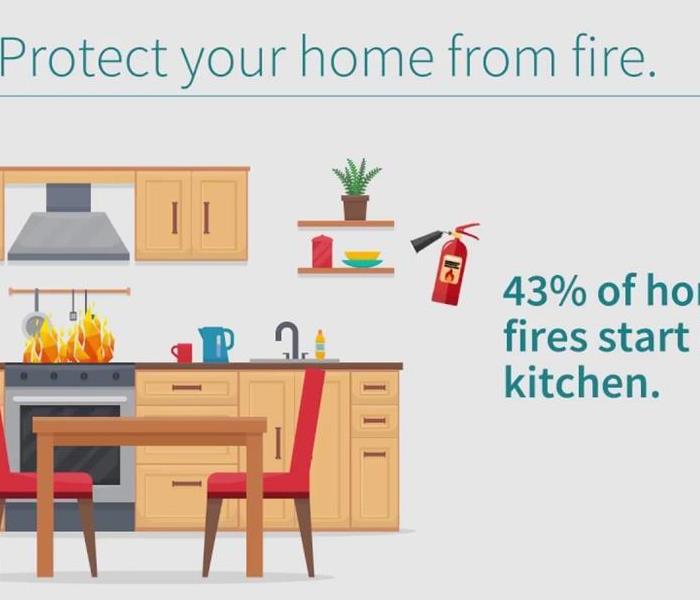Safety in the Home
4/26/2019 (Permalink)
Keep your family safe from fire. Be aware of the hazards in your home. And, be sure to have an escape plan. Pull together everyone in your household and make a plan. Walk through your home and inspect all possible exits and escape routes
Burn awareness Most “fire-related injuries” are burns. Make sure kids stay more than 3 feet away from the stove. Most “fire-related injuries” are burns. In fact, approximately every 60 seconds someone in the U.S. sustains a burn injury serious enough to require treatment.*
Dryers and washing machines The leading cause of home clothes dryer and washer fires is failure to clean them.
- Clothes dryers accounted for 92% of the fires; washing machines 4%, and washer and dryer combinations accounted for 5%.
- The leading factor contributing to the ignition of home fires involving clothes dryers was failure to clean, accounting for one-third (33%) of dryer fires.
- A mechanical or electrical failure or malfunction was involved in the vast majority of home fires involving washing machines.
- Fires involving clothes dryers usually started with the ignition of something that was being dried or was a byproduct (such as lint) of drying, while washing machine fires usually involved the ignition of some part of the appliance.
Escape planning Learn the steps to create and practice a home fire escape plan. Fire can spread rapidly through your home, leaving you as little as one or two minutes to escape safely once the smoke alarm sounds. A closed door may slow the spread of smoke, heat and fire. Install smoke alarms in every sleeping room and outside each separate sleeping area. Install alarms on every level of the home. Pull together everyone in your household and make a plan. Walk through your home and inspect all possible exits and escape routes. Households with children should consider drawing a floor plan of your home, marking two ways out of each room, including windows and doors.
Gasoline & propane safety Always handle gasoline in the home or propane-powered equipment cautiously. Handle any propane-powered equipment cautiously and always follow the manufacturer's instructions.
- Cylinder tanks for equipment such as stoves and ovens must be located outside of the home.
- Keep gasoline out of children's sight and reach. Children should never handle gasoline.
- If fire does start while handling gasoline, do not attempt to extinguish the fire or stop the flow of gasoline. Leave the area immediately, and call for help.
- Do not use or store gasoline near possible ignition sources (i.e., electrical devices, oil- or gas-fired appliances, or any other device that contains a pilot flame or a spark).
Hoarding and fire safety Many fire departments are experiencing serious fires, injuries, and deaths as the result of compulsive hoarding behavior. The excessive accumulation of materials in homes poses a significant threat to firefighters fighting fires and responding to other emergencies in these homes and to residents and neighbors.






 24/7 Emergency Service
24/7 Emergency Service
